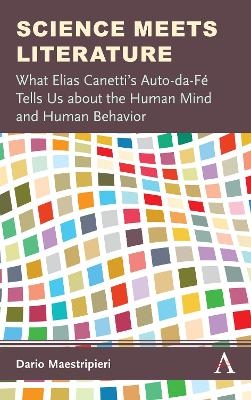
Science Meets Literature
What Elias Canetti’s Auto-da-Fé Tells Us about the Human Mind and Human Behavior
Seiten
2019
Anthem Press (Verlag)
978-1-78527-069-7 (ISBN)
Anthem Press (Verlag)
978-1-78527-069-7 (ISBN)
"Science Meets Literature" analyzes and discusses Elias Canetti's 1935 novel "Auto-da-F" (original German title, "Die Blendung") as an example of the way in which literature can contribute to the scientific understanding of the human mind and human behavior.
Elias Canetti’s 1935 novel “Auto-da-Fé” (original German title, “Die Blendung”) has traditionally been difficult to interpret and the author’s intentions in writing it have remained unclear. “Science Meets Literature” argues that “Auto-da-Fé” is a novel about human nature that illustrates the workings of the human mind and some universal aspects of human behavior and human social relationships. Canetti’s insights anticipated later scientific discoveries made by cognitive, social and evolutionary psychology including the existence of “irrational” biases in human cognition (e.g., in perception, beliefs and decision-making); the strengths and limitations of human “theory-of-mind” skills (i.e., our ability to think about other people’s minds and “read” them); the establishment, maintenance and reversal of dominance in social relationships between two individuals; and the role of dehumanization in harmful behavior. Canetti intended to warn against the conviction held by some intellectuals that human nature can be denied, controlled, ignored or dismissed. His approach in “Auto-da-Fé” was an original attempt at the integration of knowledge formation in sciences and humanities. He pointed the way for future successful attempts at the integration of evolution, cognitive science and literature, as well as for the broader integration of sciences and humanities.
Elias Canetti’s 1935 novel “Auto-da-Fé” (original German title, “Die Blendung”) has traditionally been difficult to interpret and the author’s intentions in writing it have remained unclear. “Science Meets Literature” argues that “Auto-da-Fé” is a novel about human nature that illustrates the workings of the human mind and some universal aspects of human behavior and human social relationships. Canetti’s insights anticipated later scientific discoveries made by cognitive, social and evolutionary psychology including the existence of “irrational” biases in human cognition (e.g., in perception, beliefs and decision-making); the strengths and limitations of human “theory-of-mind” skills (i.e., our ability to think about other people’s minds and “read” them); the establishment, maintenance and reversal of dominance in social relationships between two individuals; and the role of dehumanization in harmful behavior. Canetti intended to warn against the conviction held by some intellectuals that human nature can be denied, controlled, ignored or dismissed. His approach in “Auto-da-Fé” was an original attempt at the integration of knowledge formation in sciences and humanities. He pointed the way for future successful attempts at the integration of evolution, cognitive science and literature, as well as for the broader integration of sciences and humanities.
Dario Maestripieri, a professor at the University of Chicago, USA, is an interdisciplinary scholar who is interested in understanding the human mind and human behavior from multiple perspectives.
Preface; 1. Why Science and Literature?; 2. Elias Canetti: A Visionary Literary Genius on a Quest to Understand Human Nature; 3. The Plot of “Auto-da-Fé”; 4. “Auto-da-Fé” Is a Novel about Human Nature; 5. Major Themes Running through “Auto-da-Fé”; 6. Analysis of Part I: A Head without a World; 7. Analysis of Part II: Headless World; 8. Analysis of Part III: The World in the Head; 9. Narrative Strategies in “Auto-da-Fé”; 10. Consilience, the Canetti Way; Elias Canetti Bibliography; References; Acknowledgments; Index.
| Erscheinungsdatum | 18.07.2019 |
|---|---|
| Verlagsort | London |
| Sprache | englisch |
| Maße | 153 x 229 mm |
| Gewicht | 454 g |
| Themenwelt | Geisteswissenschaften ► Philosophie ► Erkenntnistheorie / Wissenschaftstheorie |
| Geisteswissenschaften ► Psychologie ► Verhaltenstherapie | |
| Geisteswissenschaften ► Sprach- / Literaturwissenschaft ► Anglistik / Amerikanistik | |
| Geisteswissenschaften ► Sprach- / Literaturwissenschaft ► Literaturwissenschaft | |
| ISBN-10 | 1-78527-069-9 / 1785270699 |
| ISBN-13 | 978-1-78527-069-7 / 9781785270697 |
| Zustand | Neuware |
| Haben Sie eine Frage zum Produkt? |
Mehr entdecken
aus dem Bereich
aus dem Bereich
die Grundlegung der modernen Philosophie
Buch | Softcover (2023)
C.H.Beck (Verlag)
18,00 €
Buch | Softcover (2023)
Reclam, Philipp (Verlag)
7,00 €


![Was heißt Denken?. Vorlesung Wintersemester 1951/52. [Was bedeutet das alles?] - Martin Heidegger](/media/113619842)